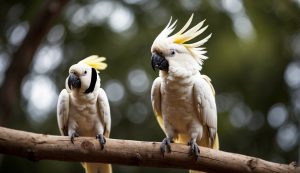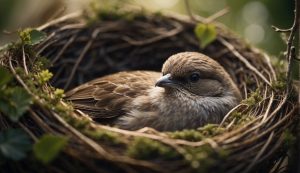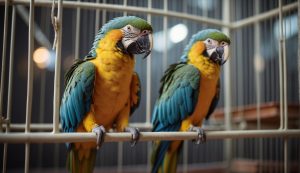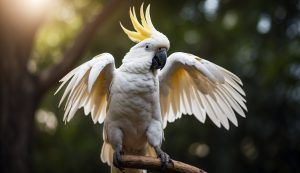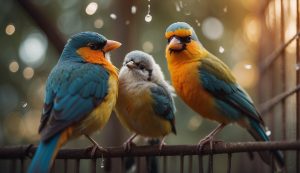Why is My African Grey Plucking His Feathers? Reasons and Remedies
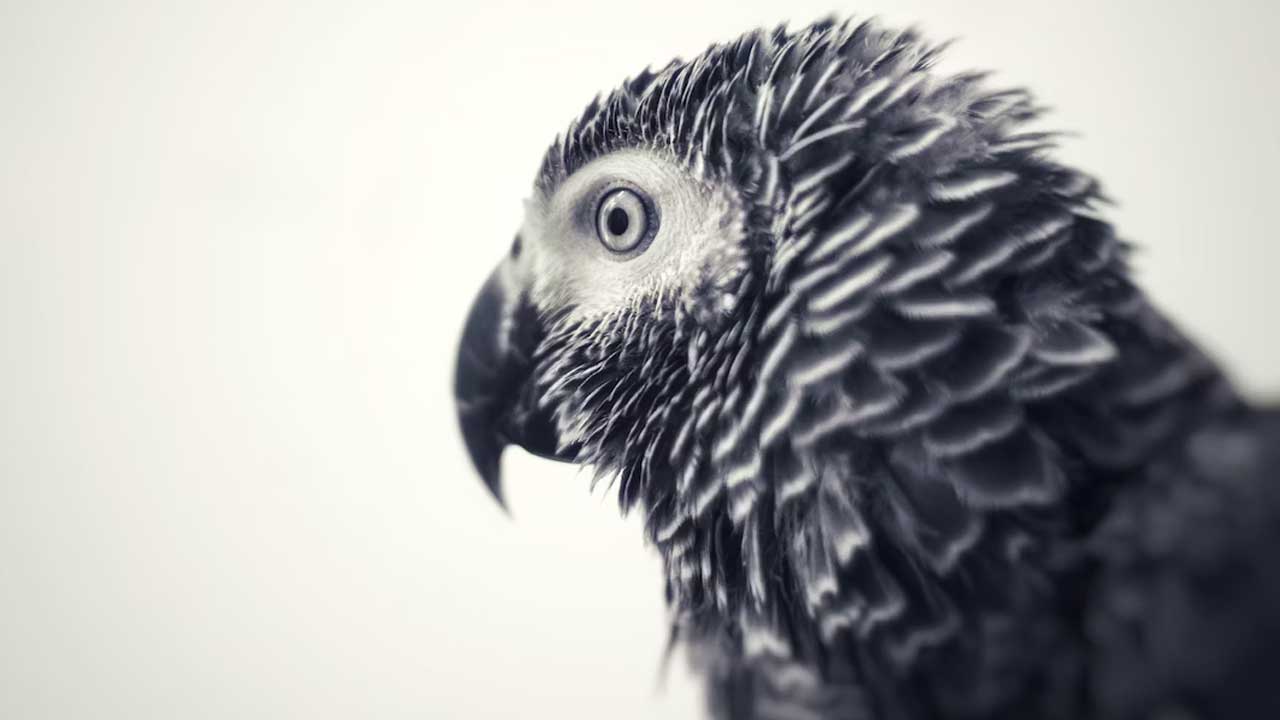
Feather plucking is a common issue faced by many African grey parrot owners. It’s both concerning and frustrating to watch your beloved pet engage in this self-destructive behavior.
Understanding the reasons behind feather plucking can help you identify the problem and take steps to improve your parrot’s health and well-being.
Quick Summary
African grey parrots may pluck their feathers for various reasons, ranging from physical ailments to emotional distress.
Factors such as dietary deficiencies, hormonal imbalances, environmental stressors, or even loneliness can contribute to this behavior.
As a responsible parrot owner, it’s essential to closely monitor your bird’s overall health and environment to address any potential triggers for feather plucking and help your parrot lead a happy and healthy life.
Key Takeaways
- Feather plucking in African grey parrots can be caused by various physical or emotional factors.
- Ensuring a proper diet, comfortable environment, and social stimulation can help reduce the likelihood of feather plucking.
- Regular veterinary check-ups can help identify and address any underlying health issues that may contribute to feather plucking.
Table of Contents
Common Causes of Feather Plucking
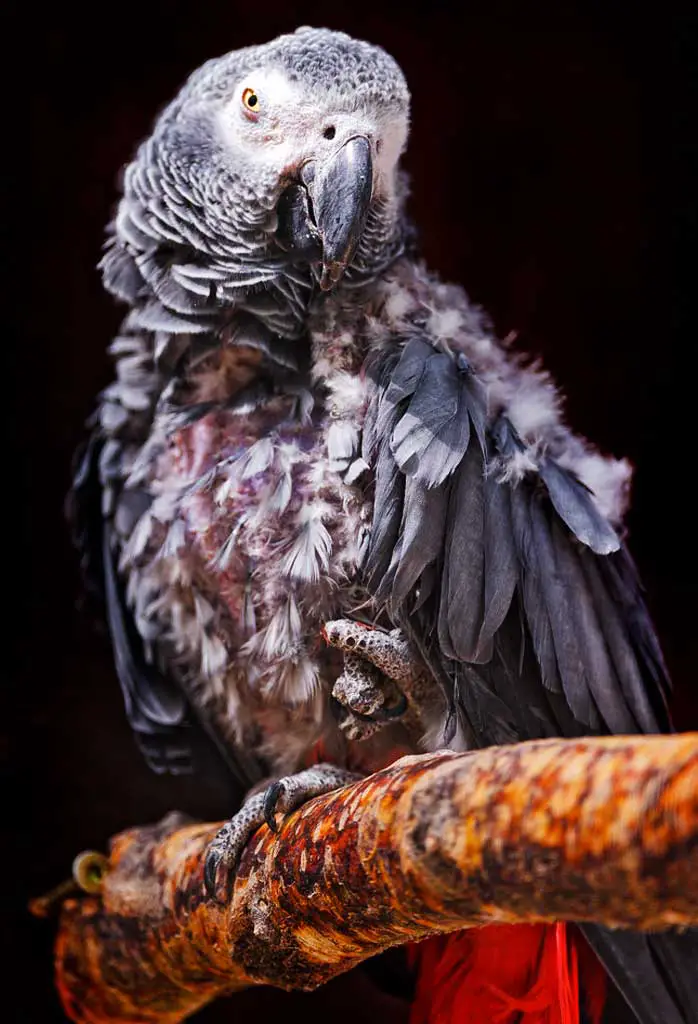
Feather plucking is a common issue among African Grey parrots. It’s essential to understand the underlying causes to help your bird maintain healthy and beautiful feathers.
This section will discuss some common causes of feather plucking, including diet and nutrition, stress and anxiety, environmental factors, hormones, boredom and lack of stimulation, and medical issues.
Diet and Nutrition
A poor diet can lead to feather plucking due to nutritional deficiencies.
Ensure that your African Grey is receiving the necessary nutrients, such as vitamins, minerals, and amino acids, in their daily diet. Offering a balanced diet—including pellets, fresh fruits, vegetables, and limited seeds—will help keep your parrot healthy and potentially prevent feather plucking due to malnutrition.
Stress and Anxiety
Stress and anxiety can cause your African Grey to pluck its feathers.
Common stressors include changes in the environment, loud noises, unfamiliar people, or feeling threatened. To reduce stress and anxiety, make sure you provide your bird with a secure and comfortable environment, establish a consistent daily routine, and use positive reinforcement when interacting with your African Grey.
Environmental Factors
Environmental factors, such as poor air quality or exposure to smoking, can contribute to feather plucking.
Nicotine in cigarette smoke is especially harmful to your bird’s health. To create a healthier environment for your African Grey, avoid smoking around your bird, and ensure proper ventilation and air filtration in their living space.
Hormones
Hormonal changes can trigger feather plucking in African Grey parrots.
If your bird is experiencing hormonal imbalances due to reproductive issues, this could lead to unwanted plucking behavior. A veterinarian may recommend treatments or hormone-blocking medications to address this hormonal issue.
Boredom and Lack of Stimulation
Boredom and lack of mental stimulation can lead to destructive behaviors, such as feather plucking, in African Grey parrots.
To prevent boredom, provide your bird with toys that encourage mental stimulation, social interaction, and physical exercise. Rotating the toys and spending quality time together will help keep your African Grey mentally and emotionally fulfilled.
Medical Issues
Lastly, medical issues may be the root cause of your African Grey’s feather plucking. Infections, parasites, allergies, and pain can all contribute to this compulsive behavior. It’s crucial to consult with a veterinarian to determine if any medical problems are causing your bird to pluck its feathers. Seeking professional advice will ensure the proper diagnosis and treatment for your African Grey’s specific needs.
Caring for Your African Grey Parrot
Caring for your African Grey Parrot involves providing them with the right elements for a healthy and happy life. In this section, we’ll cover crucial aspects like Diet and Feeding, Housing and Environment, Toys and Enrichment, Grooming and Hygiene, and Health and Veterinary Care.

Diet and Feeding
African Greys require a balanced diet consisting of pellets, fresh fruits and vegetables, and occasional treats. Pellets should make up 60-70% of their diet as they provide essential nutrients.
Offer a variety of fresh fruits and vegetables daily, with leafy greens and foods high in vitamin A, such as carrots, being particularly important. Calcium-rich foods like almonds and spinach are also necessary for proper bone development. Always provide clean, fresh water for your parrot.
Housing and Environment
Provide your African Grey with a spacious cage that allows them to fully stretch their wings and exercise. The cage should have multiple perches, with at least one cement perch to help keep their nails trimmed. A peaceful and comfortable environment is important, so keep the cage away from dusty areas or rooms with nicotine-stained fingers.
Your parrot needs 10-12 hours of sleep per night, so ensure they have a quiet place. Avoid exposing them to extreme temperatures or drafts and consider using a humidifier for proper humidity levels.
African Greys require sunlight exposure for proper calcium absorption and overall health. Ensure they receive indirect sunlight daily, either through windows or outdoor time in a secure area.
Toys and Enrichment
Toys and enrichment are essential to keep your African Grey mentally stimulated and prevent boredom, which may lead to feather plucking.
Rotate and introduce new toys regularly, focusing on foraging toys, puzzles, and destructible playthings. Providing perches at different heights and textures can also offer enrichment.
Ensure your parrot has opportunities for social interaction, and consider positive reinforcement training for mental stimulation and bonding.
Grooming and Hygiene
Maintaining proper grooming and hygiene is crucial for your parrot’s well-being.
Offer them regular baths to keep their feathers clean and skin healthy. Monitor molting times and be gentle when handling your bird during this period.
Keep their environment clean by washing the cage, perches, and toys regularly.
Health and Veterinary Care
Regular check-ups with an avian veterinarian are essential to monitor your African Grey’s health. If your parrot shows signs of illness, such as plucking feathers, bald spots, or changes in behavior, consult a vet immediately.
In some cases, medical treatment may be necessary to address underlying issues like skin infections or feather cysts.
It’s important to observe your bird closely for any changes in their behavior, diet, or appearance to identify and treat any concerns promptly.
Frequently Asked Questions
What causes feather plucking in African Greys?
Feather plucking in African Greys can be caused by various factors, including stress, boredom, poor diet, or medical issues.
To identify the cause, evaluate your bird’s environment, diet, and well-being, and consult a veterinarian for a thorough check-up.
How to prevent African Grey feather plucking?
To prevent feather plucking, provide your African Grey with a well-balanced diet, enriched living space, and regular social interaction.
Make sure that the cage is clean and large enough for your parrot to move comfortably. Provide toys and enrichment activities, such as foraging, to keep your bird engaged.
What are some home remedies for feather plucking?
Home remedies for feather plucking include increasing humidity around the cage with a humidifier, providing bath opportunities, and applying aloe vera gel on the affected areas to soothe the skin.
Are there any sprays to discourage feather plucking?
Yes, there are various anti-plucking sprays available in pet stores, specifically formulated to discourage feather plucking. These products often contain bitterants that deter birds from plucking their feathers.
How to differentiate between molting and feather plucking?
Molting is a natural process where birds lose and replace feathers, often occurring once or twice a year. Molting is characterized by symmetrical feather loss, while feather plucking is uneven and may result in bald patches.
If you suspect feather plucking, consult your veterinarian for an accurate diagnosis.
How to treat feather loss in parrots?
To treat feather loss in parrots, consult your veterinarian for a proper diagnosis and specific treatment plan. Depending on the cause, the treatment may include behavioral therapy, dietary changes, or medical treatment. Providing a stress-free environment and social interaction can also help support your bird’s recovery.

